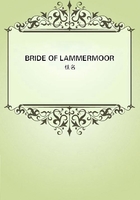
第16章
It was said by a constant tradition that a Malisius de Ravenswood had, in the 13th century, been deprived of his castle and lands by a powerful usurper, who had for a while enjoyed his spoils in quiet. At length, on the eve of a costly banquet, Ravenswood, who had watched his opportunity, introduced himself into the castle with a small band of faithful retainers. The serving of the expected feast was impatiently looked for by the guests, and clamorously demended by the temporary master of the castle. Ravenswood, who had assumed the disguise of a sewer upon the occasion, answered, in a stern voice, "I bide my time"; and at the same moment a bull's head, the ancient symbol of death, was placed upon the table. The explosion of the conspiracy took place upon the signal, and the usurper and his followers were put to death. Perhaps there was something in this still known and often repeated story which came immediately home to the breast and conscience of the Lord Keeper; for, putting from him the paper on which he had begun his report, and carefully locking the memoranda which he had prepared into a cabinet which stood beside him, he proceeded to walk abroad, as if for the purpose of collecting his ideas, and reflecting farther on the consequences of the step which he was about to take, ere yet they became inevitable.
In passing through a large Gothic ante-room, Sir William Ashton heard the sound of his daughter's lute. Music, when the performers are concealed, affects us with a pleasure mingled with surprise, and reminds us of the natural concert of birds among the leafy bowers. The statesman, though little accustomed to give way to emotions of this natural and simple class, was still a man and a father. he stopped, therefore, and listened, while the silver tones of Lucy Ashton's voice mingled with the accompaniment in an ancient air, to which soem one had adapted the following words:
"Look not thou on beauty's charming, Sit thou still when kings are arming, Taste not when the wine-cup glistens, Speak not when the people listens, Stop thine ear against the singer, From the red gold keep they finger, Vacant heart, and hand, and eye, Easy live and quiet die."The sounds ceased, and the Keeper entered his daughter's apartment.
The words she had chosen seemed particularly adapted to her character; for Lucy Ashton's exquisitely beautiful, yet somewhat girlish features were formed to express peace of mind, serenity, and indifference to the tinsel of wordly pleasure. Her locks, which were of shadowy gold, divided on a brow of exquisite whiteness, like a gleam of broken and pallid sunshine upon a hill of snow. The expression of the countenance was in the last degree gentle, soft, timid, and feminine, and seemed rather to shrink from the most casual look of a stranger than to court his admiration. Something there was of a Madonna cast, perhaps the result of delicate health, and of residence in a family where the dispositions of the inmates were fiercer, more active, and energetic than her own.
Yet her passiveness of disposition was by no means owing to an indifferent or unfeeling mind. Left to the impulse of her own taste and feelings, Lucy Ashton was peculiarly accessible to those of a romantic cast. her secret delight was in the old legendary tales of ardent devotion and unalterable affection, chequered as they so often are with strange adventures and supernatural horrors. This was her favoured fairy realm, and here she erected her aerial palaces. But it was only in secret that she laboured at this delusive though delightful architecture. In her retired chamber, or in the woodland bower which she had chosen for her own, and called after her name, she was in fancy distributing the prizes at the tournament, or raining down influence from her eyes on the valiant combatants:
or she was wandering in the wilderness with Una, under escort of the generous lion; or she was identifying herself with the simple yet noble-minded Miranda in the isle of wonder and enchantment.
But in her exterior relations to things of this world, Lucy willingly received the ruling impulse from those around her. The alternative was, in general, too indifferent to her to render resistance desirable, and she willingly found a motive for decision in the opinion of her friends which perhaps she might have sought for in vain in her own choice. Every reader must have observed in some family of his acquaintance some individual of a temper soft and yielding, who, mixed with stronger and more ardent minds, is borne along by the will of others, with as little power of opposition as the flower which is flung into a running stream. It usually happens that such a compliant and easy disposition, which resigns itself without murmur to the guidance of others, becomes the darling of those to whose inclinations its own seem to be offered, in ungrudging and ready sacrifice.
This was eminently the case with Lucy Ashton. Her politic, wary, and wordly father felt for her an affection the strength of which sometimes surprised him into an unusual emotion. Her elder brother, who trode the path of ambition with a haughtier step than his father, had also more of human affection. Asoldier, and in a dissolute age, he preferred his sister Lucy even to pleasure and to military preferment and distinction. Her younger brother, at an age when trifles chiefly occupied his mind, made her the confidante of all his pleasures and anxieties, his success in field-sports, and his quarrels with his tutor and instructors. To these details, however trivial, Lucy lent patient and not indifferent attention. They moved and interested Henry, and that was enough to secure her ear.